The 9th EU-China Business Summit took place on 21st November, 2013, at the Great Hall of the People in Beijing. The event was jointly organised by the European Union Chamber of Commerce in China and the China Council for the Promotion of International Trade (CCPIT), under the patronage of the European Commission and the Ministry of Commerce (MOFCOM), and with collaboration from the EU-China Business Association and BUSINESS EUROPE.
Attended by more than 700 business leaders from Europe and China, and concluding with speeches by European Commission President Jose Manuel Barroso, European Council President Herman Van Rompuy and Chinese Premier Li Keqiang, the EU-China Summit is the most important annual event for promoting and reinforcing EU-China relations.
Restructuring for Sustainable Growth
Under the theme Restructuring for Sustainable Growth, the day kicked off with three consecutive workshops: Creating an Innovation Driven Economy; Investment in Society; and The Role of Business in Global Economic Integration.
Following a networking lunch the afternoon continued with the Business Plenary Session moderated by Stephen Philips, Chief Executive of the China-Britain Business Council. Panellists included Mr Wan Jifei, Chairman of the CCPIT; Davide Cucino, President of the European Chamber; Emma Marcegaglia, President of BUSINESSEUROPE; Mr Wang Hongzhang, Chairman and Executive Director of China Construction Bank; Francois Desprairies, Senior Vice President of Airbus; Mr Yu Liang, President of China Vanke Co Ltd; and Dr Axel Schweitzer, Chief Executive Officer of Alba Group.
There was a general consensus among the panellists that recent reforms announced after the Third Plenum would lead to increased opportunities for Chinese and European business, and that cooperation and sharing of knowledge and best practices would be hugely important to the future of EU-China development.
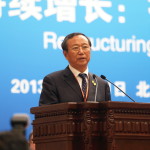 Wan Jifei: importance of the summit
Wan Jifei: importance of the summit
In his opening address CCPIT’s Wan Jifei spoke of the importance of the summit as a way of strengthening strategic partnerships between the EU and China and emphasised its stature as the most significant, high-level platform for business dialogue between the two regions. “Both sides need to be flexible to respond to challenges,” he said, “but both sides have many common interests.” Following the Third Plenum Decision Mr Wan also said that it was now time to deepen the implementation of proposed reforms and that the EU would have a large role to play in this.
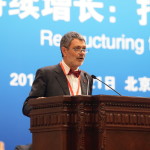 Davide Cucino: The Decision mirrors Chamber Position Paper
Davide Cucino: The Decision mirrors Chamber Position Paper
President Cucino spoke at length about The Third Plenum Decision and how much of it mirrored key recommendations in the Chamber’s Position Paper.
“The Chamber’s overarching recommendation was that a better use of market forces should be the catalyst to direct China’s increasingly limited resources to the most productive areas of society and that this would inevitably entail a fundamental reassessment of the government’s role in the economy,” Cucino said. He continued by pointing out that the “Third Plenum Decision stated the core issue for economic structural reform to be an improvement in the relationship between the government and the market and a more decisive role for the market in resource allocation.”
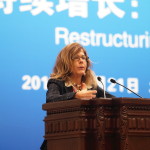 Emma Marcegaglia: bilateral investment agreement welcomed
Emma Marcegaglia: bilateral investment agreement welcomed
President Marcegaglia concentrated on the anticipated announcement of the blueprint for increased cooperation between Europe and China in the form of negotiations for a bilateral investment agreement. “We are calling for an agreement with a high level of ambition, covering both market access and investment protection, creating a genuine level playing field for European and Chinese companies,” she said. “We know that such negotiations will be challenging, but we also know they will be very valuable to investors in the EU and in China.”
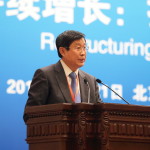 Wang Hongzhang: opportunities abound
Wang Hongzhang: opportunities abound
Mr Wang was optimistic about the improvements to the Chinese economy that have already taken place, particularly the strengthening of domestic consumption which has been identified as an integral driver of future economic growth. He pointed to further improvements that are required, in particular how financial institutions can contribute more to China’s ambitious urbanisation plans by supporting more industries involved in sustainable and environmentally-friendly technologies. He also acknowledged that “renminbi convertibility still requires much work, as do many areas of the financial markets, but all of this presents new opportunities.”
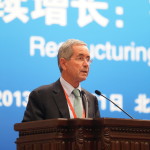 Francois Desprairies: EU-China civil aviation cooperation crucial
Francois Desprairies: EU-China civil aviation cooperation crucial
Mr Desprairies identified aviation as a key industry for supporting exchanges between the EU and China. Referring to the EU-China Civil Aviation Project (EUCCAP) as a flagship for EU-China cooperation in the industry, Desprairies spoke of how much has already been accomplished and how much more the EU can contribute. He said that although “the EU has a strong aviation sector with a powerful industry and advanced technologies, the growth of air traffic is here in China”. With China’s air traffic set to double in volume over the next decade, he said, it will become the number one aviation market, making “the interest of [continued] cooperation between the EU and China obvious.”
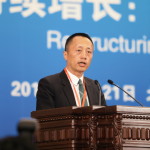 Yu Liang: sustainable development is the global challenge
Yu Liang: sustainable development is the global challenge
Vanke’s Yu Liang shifted the emphasis to green growth identifying sustainable development as “the global challenge”. He said that China is working hard to achieve its targets in this area but acknowledged that urban waste from construction is a large challenge that needs to be addressed. During the Q&A session that followed the presentations, Yu answered a question on how ‘selling’ green initiatives to other property developers was progressing, responding that “facilities are often not up to scratch, but the awareness is there.”
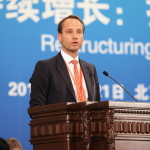 Axel Schweitzer: second earth required
Axel Schweitzer: second earth required
Continuing the theme of sustainable development, Dr Schweitzer said that this was a “shared challenge and a common task…for Europe and China”. Speaking about the alarming increase in the consumption of natural resources, Schweitzer said, “If, over the next few years, we do not succeed in achieving economic growth without increased resource consumption, we will need a second earth in 18 years time!”
The summit was brought to a positive close with speeches from the political leaders who had taken a short walk from the Political Summit which had been taking place in parallel with the Business Summit.
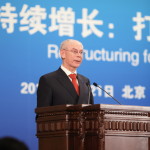 Herman Van Rompuy: more can be done
Herman Van Rompuy: more can be done
President Van Rompuy was delighted to announce that an agreement to commence negotiations on the EU-China Bilateral Investment Agreement had been reached, which he described as a “major outcome” of the EU-China Summit. He underlined that “the current level of bilateral investment is too low compared to the level of engagement”.
Last year, Van Rompuy pointed out, during one quarter the volume of trade between the EU and China actually surpassed that between the EU and the United States for the very first time. This “positive rivalry” between the EU, China and the United States, he said, should be encouraged and was good for the global economy and society as a whole. He also highlighted China’s urbanisation process and the greening of its economy as a major opportunity for EU and Chinese companies.
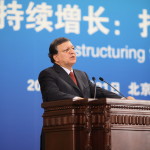 Jose Manuel Barroso: people matter
Jose Manuel Barroso: people matter
President Barroso also expressed his satisfaction at the announcement of negotiations, but added a note of caution saying that “without concrete actions the vision is meaningless,” continuing, “deep and significant reforms must support sustainable growth in China.”
Of the EU-China Summit he said, “This is no ordinary summit. There cannot be an ordinary summit between two extraordinary partners.” He went on to underline the important role that individuals and business played in EU-China relations saying, “Ultimately, strategic partnerships do not rely on contact between officials and policy commitments alone, they rely on people. People like you, from the business community. People who translate political views into tangible actions and results.”
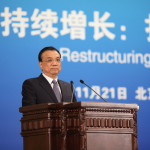 Li Keqiang: strong message sent
Li Keqiang: strong message sent
Premier Li’s speech echoed positive sentiments on the agreement and said that at the preceding joint press conference the three leaders had “sent a strong message to the rest of the world.”
Li said that the current strategic partnership between the two regions was based on trust and mutual benefit but that, although the volume and scope of bilateral trade has grown rapidly, two-way investment is still “yet to reach its full potential.” To achieve sustained and healthy growth Li said, “We must advance trade facilitation and expand hi-tech cooperation, increase high-tech imports to China and promote two-way investment.”
Acknowledging that the two regions are in different stages of development Li said there are many areas for potential cooperation, explaining that cooperation should be advanced through the World Trade Organisation and that both sides should eschew protectionism.
“We want to see a level playing field for EU and Chinese companies,” Li said.

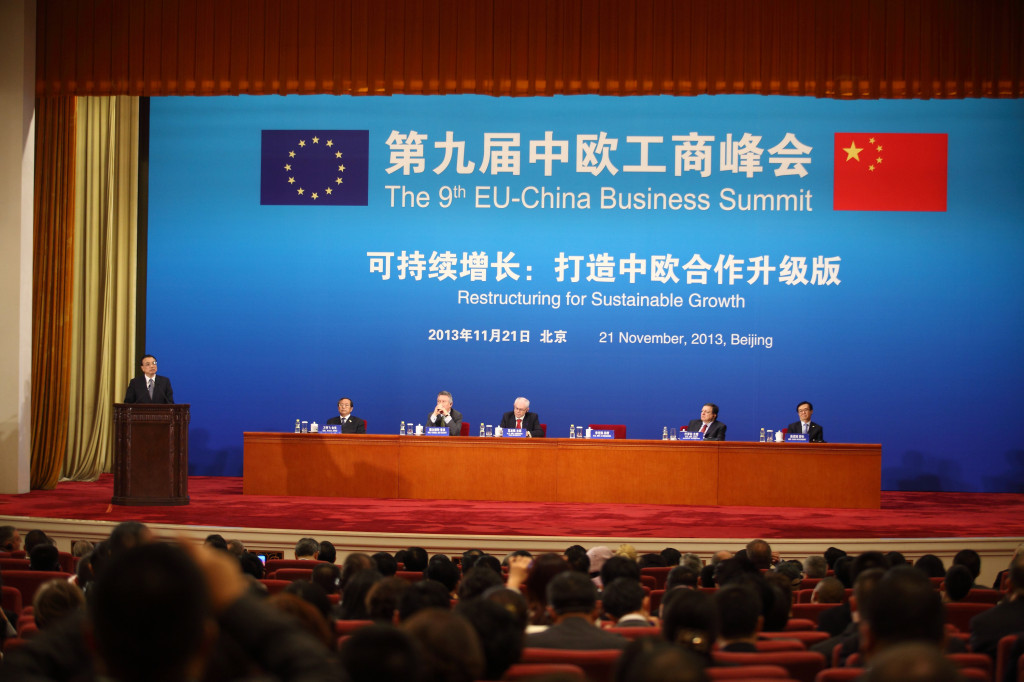
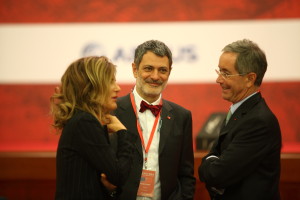

Recent Comments